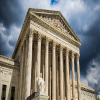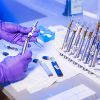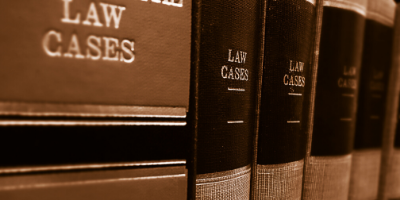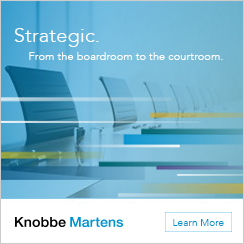Quarterly Journal 50-3
In This Section
 QJ 50.3 - Marijuana and Patents: The Complicated Relationship Between Patent Rights and the Federal Criminalization of Marijuana
QJ 50.3 - Marijuana and Patents: The Complicated Relationship Between Patent Rights and the Federal Criminalization of Marijuana
Reza Roghani Esfahani and Howard Bromberg
Despite being expressly protected by the U.S. Constitution, patent protection and enforcement for marijuana-related inventions is mired in many questions. These questions are a subset of the contradictions in the law of marijuana, where the federal government prohibits marijuana use and yet many of the states legalize, regulate, and tax it. In patent procurement context, these questions arise because of the interplay between marijuana prohibition as a Schedule I drug and the patentability requirements of the Patent Act. In patent enforcement context, these questions are the result of the federal judiciary’s responsibility to interpret and administer all federal laws—including the Controlled Substance Act, classifying marijuana as a Schedule I drug, and the Patent Act, demanding remedy for infringement of patents that necessarily advance illegal activity. This article examines the interface of some of the patentability requirements of the Patent Act with marijuana-related inventions. The article concludes that although marijuana-related inventions are likely patentable, criminalization of marijuana affects the quality of the granted patents. Further, this article identifies several issues that arise in enforcing a marijuana-related patent in federal court. These issues may include securing representation, dangers of self-incrimination, and identifying infringing parties. As a byproduct of these issues, this article concludes that the marijuana industry may be particularly vulnerable to frivolous lawsuits by Patent Assertion Entities.
 QJ 50.3 - Tragedy of the Commons: Why the Supreme Court’s Literal Application of “Product of Nature” Rule in AMP v. Myriad Genetics Necessitates a Legislative Change to 35 U.S.C. § 101
QJ 50.3 - Tragedy of the Commons: Why the Supreme Court’s Literal Application of “Product of Nature” Rule in AMP v. Myriad Genetics Necessitates a Legislative Change to 35 U.S.C. § 101
Henry Loznev
 QJ 50.3 - Not So Natural Phenomena: A Look at § 101’s Impact on Biotech Patents
QJ 50.3 - Not So Natural Phenomena: A Look at § 101’s Impact on Biotech Patents
Jordan M. Cowger
This note seeks to address the uncertainty surrounding patent eligibility for DNA and DNA-derivative pharmaceuticals. Inconsistent judicial decisions and lack of action by the Supreme Court make this issue ripe for resolution. Due to the importance of DNA-derivative pharmaceuticals—not just to precision medicine but also to the United States’ position as a life science leader in the global economy—Congress must take action now. Following Europe’s approach, Congress should adopt a revised version of the draft Tillis-Coons STRONGER Patents Act, which includes an additional subsection to section 101 specifically calling for patent protection for DNA-derivative inventions.
 QJ 50.3 - Technological Fault Lines: The Problems with Tailoring Patent Eligibility at the USPTO
QJ 50.3 - Technological Fault Lines: The Problems with Tailoring Patent Eligibility at the USPTO
Joshua A. Lopez
Many members of the patent community seek clarification of subject matter eligibility law, but administrative rulemaking would be a problematic approach. The Supreme Court has carved out what qualifies as a “process, machine, manufacture, or composition of matter” under 35 U.S.C. § 101 - Inventions patentable. Although the Court has dealt with this statute in decades past, it began in 2012 to reinvigorate the rule that “laws of nature, natural phenomena, and abstract ideas” are not patent eligible. Mayo, Myriad, and Alice mark the Court’s recent encounters with section 101. Respectively, these cases have heightened the patent standard for three major areas: diagnostic tools, genetics, and software. If Congress grants the USPTO rulemaking authority to clarify or enhance the eligibility standards, the agency’s rules would likely reflect a similar technological split. This is problematic because technological discrimination is prohibited under TRIPS Article 27, and divided USPTO rule makers could invite harmful divide-and-conquer influence. Legislators should work to make section 101 more fair and sensible, but they should delegate rulemaking authority with caution.
Upcoming Events
-
.png?sfvrsn=48c235e_1) 2026 Patent Prosecution Bootcamp - Arlington, VA
2026 Patent Prosecution Bootcamp - Arlington, VA
March 4 to 6, 2026 | Up to 1235 minutes, including 60 Ethics minutes
-
 AIPLA CLE Webinar: Damages 2025 Year-in-Review: Lessons and Litigation Strategies
AIPLA CLE Webinar: Damages 2025 Year-in-Review: Lessons and Litigation Strategies
March 11, 2026 2:00 PM to 3:30 PM | Eligible for up to 90 Mins CLE
-
.png?sfvrsn=20d96f46_1) AIPLA LinkedIn Live: What the 2025 AIPLA Economic Survey Reveals About IP Practice Today
AIPLA LinkedIn Live: What the 2025 AIPLA Economic Survey Reveals About IP Practice Today
March 12, 2026 12:00 PM to 12:45 PM
-
2026 Women in IP Global Networking Event
April 16, 2026
The annual Global Networking Event connects intellectual property practitioners from around the world for a day of networking, education, and creating meaningful connections. This year’s theme, Rooted in Real - Women in IP Redefining the Narrative, is an opportunity for the AIPLA Women in IP Law Committee to celebrate authentic experiences, foster genuine connections, and showcase the real stories of women shaping the field of intellectual property law. -
-(1).png?sfvrsn=169c8b82_1) Careers in IP
Careers in IP
April 22, 2026 12:30 PM to 1:30 PM | No CLE

